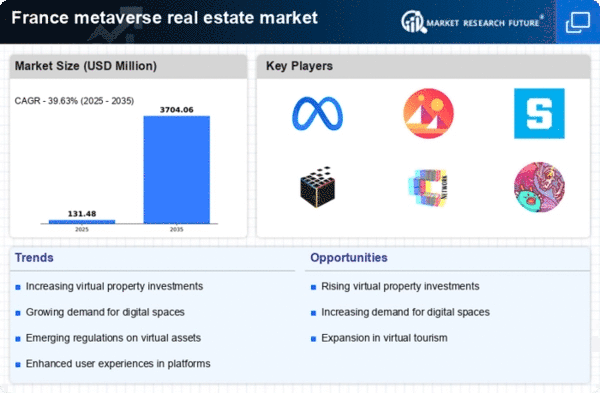Evolving Consumer Preferences
Consumer preferences are shifting towards digital solutions, significantly impacting the metaverse in-real-estate market. As younger generations become primary homebuyers, their familiarity with digital platforms drives demand for virtual property transactions. In France, surveys indicate that over 60% of millennials prefer online property searches, suggesting a strong inclination towards virtual real estate solutions. This trend is likely to encourage real estate developers to invest in metaverse platforms, creating a more dynamic and interactive marketplace. Additionally, the convenience of virtual transactions aligns with the fast-paced lifestyle of modern consumers, further solidifying the metaverse's role in the real estate sector.
Regulatory Developments and Legal Frameworks
Evolving regulatory developments and legal frameworks in France influence the metaverse in-real-estate market. As the market matures, the need for clear regulations regarding virtual property ownership and transactions becomes increasingly apparent. The French government is actively exploring policies to address these challenges, which could enhance consumer confidence and stimulate market growth. For instance, the establishment of legal guidelines for virtual property rights may encourage more individuals to invest in the metaverse. This regulatory clarity is expected to foster a more stable environment for transactions, ultimately benefiting the metaverse in-real-estate market.
Investment Opportunities in Virtual Real Estate
The metaverse in-real-estate market presents lucrative investment opportunities, attracting both individual and institutional investors. In France, the value of virtual land has seen a remarkable increase, with some properties selling for upwards of €1 million. This trend indicates a growing recognition of virtual real estate as a viable asset class. Investors are drawn to the potential for high returns, as the demand for virtual spaces continues to rise. Furthermore, the emergence of virtual marketplaces facilitates easier transactions, making it simpler for investors to enter the metaverse in-real-estate market. This influx of capital is likely to accelerate the development of virtual properties, enhancing the overall market landscape.
Collaborations Between Tech and Real Estate Firms
Collaborations between technology companies and real estate firms are shaping the metaverse in-real-estate market. In France, partnerships are emerging to leverage technological expertise in creating immersive virtual experiences for property buyers. These collaborations aim to enhance the quality of virtual listings and streamline the buying process. By combining real estate knowledge with cutting-edge technology, firms can offer innovative solutions that cater to the evolving demands of consumers. This synergy is likely to drive growth in the metaverse in-real-estate market, as enhanced offerings attract a wider audience and facilitate more efficient transactions.
Technological Advancements in Virtual Environments
The metaverse in-real-estate market is experiencing a surge due to rapid technological advancements. Innovations in virtual environments are enhancing property viewing experiences. Innovations in augmented reality (AR) and virtual reality (VR) are enhancing property viewing experiences, allowing potential buyers to explore properties from the comfort of their homes. In France, the integration of these technologies is projected to increase user engagement by approximately 30% over the next few years. This heightened interaction is likely to drive demand for virtual properties, as users become more accustomed to immersive experiences. Furthermore, the development of high-speed internet infrastructure across the country supports seamless access to these virtual environments, making the metaverse in-real-estate market increasingly accessible to a broader audience.
















Leave a Comment